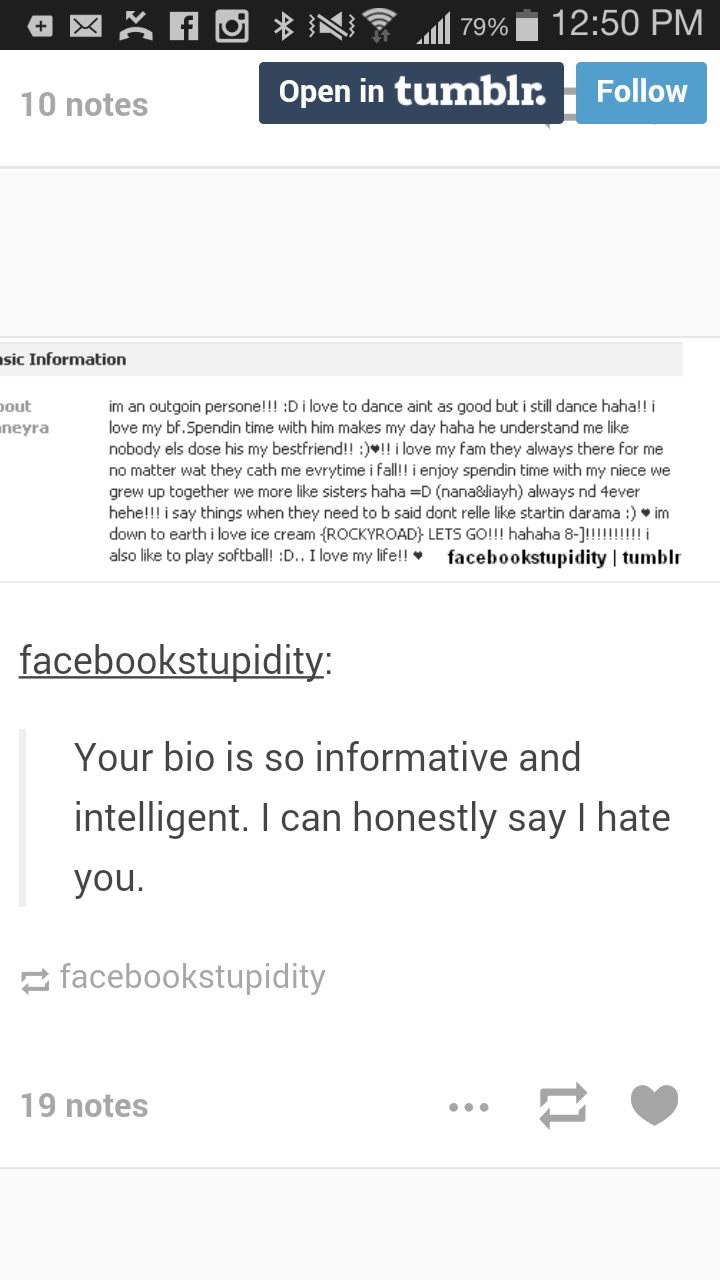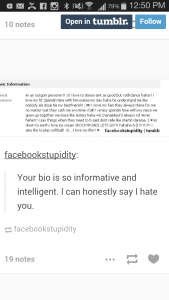
Facebook Fails
While the language of Mary Hamilton’s article was pretty dry and academic, I found the information to be really helpful in figuring out how to choose and analyze an image of a literacy event. Even though we’ve already kind of discussed this in class, I appreciated the way that Hamilton went out of her way at the beginning of the article to clarify that modern literacy studies have more to do with social practice and institutions with embedded literacy than with simple reading and writing. I’m one of the people who had no idea what “literacy studies” even meant when I enrolled in this class, so I am still getting used to thinking of literacy studies in this way!
The image that I chose to analyse for this assignment is a screenshot that I took of a web page entitled “Facebook Fails”. Just like many other similar sites, this Tumblr is devoted to posting stupid things that other people write on Facebook, and creating a platform for people to make fun of them. It’s pretty difficult to read the original post in this picture, but if you click on it you should be able to make it bigger!
There are obviously two layers to this literacy event: the original post, which is a bio from a Facebook page, and the fact that this piece of text has been re-posted with accompanying judgmental commentary onto the Facebook Fails Tumblr. This puts it into the category of “Interactions between people and texts” from the article. Other than this, though, I don’t feel like this literacy event fits very comfortably into any of the other literacy types mentioned in Hamilton’s article. The act of belittling another person’s perceived literary ability or intelligence might be categorized as a sort of “Literacy as Display” – one could assume that the person making fun of the original text is making a statement about their own literacy abilities by mocking and distancing themselves from the original post. But this would be a stretch from Hamilton’s definition of “Literacy as Display”, which she describes in the article as having more to do with words and logos that create a group identity. Perhaps this event could be labelled something like “Literacy as Status Determiner” or “Literacy as Social Filter”. I’m not particularly satisfied with either of these titles, but I’m trying to get at something which encapsulates the way that people can infer what “type of person” someone is based upon their writing style and perceived ability or intelligence. (As in the case of the commenter in the image, who writes “Your bio is so informative and intelligent. I can honestly say I hate you.”) I would be interested to hear what others think about this image. What kind of title do you think we could put on it that would help us understand what is going on here?


 Website:
Website:
One Reply to “Facebook Fails”
I like the idea of this being “Literacy as Social Filter” since that’s really what a bio is. The more clever, creative, informative, etc. it is, the more we know of that person and judge them. The response text in this image is a perfect example of that. What’s funny is that online bios are rarely representative of what peoe are like in real life. It’s just the basic information that creates your online identity.